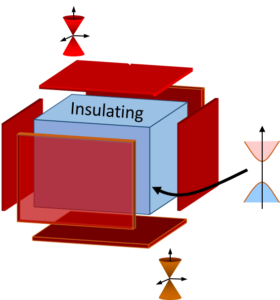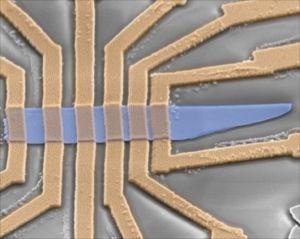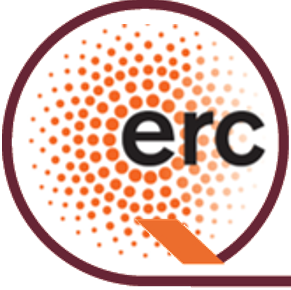 Recently, the coupling between topological insulators (TI’s) and superconductivity has sparked a wide research interest, due to the prospect of measuring and controlling Majorana Andreev bound states. Owing to the large spin-orbit interaction that modifies the band structure topology, TI’s exhibit an insulating bulk state and gapless metallic surface states with linear dispersion as for massless Dirac fermions. The properties of these surfaces states are unusual: The spin is locked to the momentum, providing protection against back-scattering (i.e. localization). Furthermore, when the surface state is coupled to superconductivity, the spin-momentum locking yields an unconventional p-wave superconductivity, which carries zero-energy Majorana states.
Recently, the coupling between topological insulators (TI’s) and superconductivity has sparked a wide research interest, due to the prospect of measuring and controlling Majorana Andreev bound states. Owing to the large spin-orbit interaction that modifies the band structure topology, TI’s exhibit an insulating bulk state and gapless metallic surface states with linear dispersion as for massless Dirac fermions. The properties of these surfaces states are unusual: The spin is locked to the momentum, providing protection against back-scattering (i.e. localization). Furthermore, when the surface state is coupled to superconductivity, the spin-momentum locking yields an unconventional p-wave superconductivity, which carries zero-energy Majorana states.
In our group we grow a variety of high quality TI crystals (e.g. Bi2Se3, Bi2Se2Te, BiSbTeSe2, and superconducting CuxBi2Se3), and prepare exfoliated nano-devices for investigating the coupling between superconducting electrodes and topological surface states. We are currently focusing our research effort on the quantum transport properties such topological Josephson junctions.

Publications:
- L. Veyrat et al. Helical quantum Hall phase in graphene on SrTiO3, Arxiv:1907.02299 (2019)
- K. Le Calvez, et al. Joule overheating poisons the fractional ac Josephson effect in topological Josephson junctions, Communications Physics, 2:4 (2019)
- B. Sacépé, et al. Gate-tuned normal and superconducting transport at the surface of a topological insulator, Nature Communications 2:575 (2011)
Collaborations: Philippe Plaindoux (I. Néel), Frédéric Gay (I. Néel), Hervé Courtois (I. Néel), Clemens Winkelmann (I. Néel), Claude Chapelier (CEA / INAC), Manuel Houzet (CEA / INAC), Julia Meyer (CEA / INAC / UGA)
